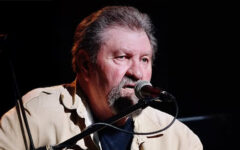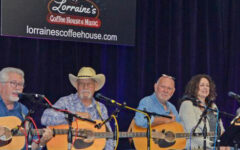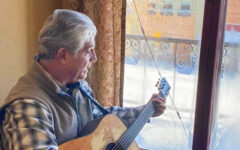 Louisa Branscomb remembers the feeling of a different IBMA world. Walking along the banks of the Ohio river at a past World of Bluegrass celebration (then held in Owensboro, Kentucky), she reflected on the honors bestowed upon groups, vocalists, instrumentalists, and broadcast personalities. There were even awards for designers of album art, and writers of liner notes for those albums. But, there was nary a mention of the people who craft the songs that are sung, and played, and written about.
Louisa Branscomb remembers the feeling of a different IBMA world. Walking along the banks of the Ohio river at a past World of Bluegrass celebration (then held in Owensboro, Kentucky), she reflected on the honors bestowed upon groups, vocalists, instrumentalists, and broadcast personalities. There were even awards for designers of album art, and writers of liner notes for those albums. But, there was nary a mention of the people who craft the songs that are sung, and played, and written about.
Branscomb would have liked to commiserate with other composers. After all, there were surely others who felt as she did. She scanned the conference materials; maybe there was a class or meeting where she might find other songwriters, or perhaps a listing of those who shared her craft. She found nothing. She recognized that efforts to include songwriters in the IBMA community were lacking, and she determined to do something about it. “It was really strange to be walking in the midst of this international effort to promote bluegrass music, feeling absolutely lonely,” she said.
A glance at the list of IBMA Hall of Fame inductees shows that Branscomb’s conclusions were warranted. In addition to the many bands and individuals that performed bluegrass music, you’ll find names such as these: Peter Kuykendall, Carlton Haney, Lance LeRoy, David Freeman, Bill Vernon, Syd Nathan, Charles Wolfe, Louise Scruggs. Managers, promoters, organizers, founders of festivals and publications; all made contributions to Bluegrass music that were deemed hall-of-fame worthy. Pete Goble is not listed. Neither is Carl Jackson. Randall Hylton’s name doesn’t appear; nor Tom T. Hall’s. A few of the listed performers penned some of the material they recorded, but their songwriting, if mentioned at all, is a veritable footnote to their performing.
Branscomb approached the IBMA Board of Directors. “Songwriters need three things from IBMA,” she told them, “education, networking, and recognition.” She pointed out that these are the same needs the organization routinely addresses for musicians. A committee was created, and rooms were made available for “song circles,” allowing Branscomb and a few others to attempt to fill the gaps. Later, songwriter showcases were scheduled. Still, enthusiasm was slow to build and participation grew at a snail’s pace. It was almost as if the IBMA was permitting, rather than promoting, the songwriting program. Other writers, like Mark “Brink” Brinkman, John Pennell and Rick Lang, worked tirelessly along with Branscomb to get the board’s backing for the fledgling effort.
2011 may be remembered as the year their efforts reached the IBMA tipping point. At the World of Bluegrass event, songwriter circles were a daily occurrence. There were workshop events on the subjects of songwriting, co-writing, song-pitching, and even one featuring the music of The Beatles. Song Demo listening sessions were conducted where songwriters received critiques of their works from industry professionals. Branscomb, Brinkman and Pennell were joined by bluegrass great Larry Cordle to showcase some of their music, with Jeanette and Johnny Williams assisting on some of the vocals. A special highlight was the Songwriter Networking Reception that brought songwriters face-to-face with artists, producers, publishers and record label executives.
While opportunities for songwriter education and networking abounded at the 2011 WOB, the third leg of the songwriter committee’s mission statement, recognition, was still lacking. The Awards program featured no songwriter-specific awards. According to an exited Louisa Branscomb, that will change in 2012. “For the first time,” she said, “There will be a ‘Songwriter of the Year’ award!” She makes clear that selection criteria still need to be set, but she sees the addition of the category as a victory for songwriters. “We’re part of the community, too,” she points out.
Branscomb and the rest of the committee aren’t done yet. “There’s a lot of catching up to do,” she says. “We’ll be working with the board to recognize past songwriters through the Distinguished Awards program.” Brinkman agrees. “It’s an absolute shame that Pete Goble isn’t in the Hall of Fame, “he said. “Some of the stars performing here this week have been honored in the past for playing his music. You can’t walk the halls without hearing someone jamming to a Pete Goble song.” Like Branscomb, Brinkman plans to continue his efforts to include songwriters in the IBMA community.
There’s a good possibility that a future recipient of the IBMA Songwriter of the Year award is presently serving on the Songwriter Committee. However, any one of them will quickly tell you that their efforts are on behalf of all bluegrass songwriters. “We’re part of the community,” Branscomb points out. At IBMA, it’s coming true as she and others continue to craft that community.
Working with Louisa, among others, are:
- Louisa Branscomb has seen her songs recorded by dozens of artists, including Alison Krauss, John Denver, Dale Ann Bradley, Frances Mooney & Fontana Sunset, and the McPeak Brothers. Steel Rails is the most well-known of her compositions, recorded by numerous artists including Denver, Krauss, and an unreleased version by Mel Tillis.
- Mark “Brink” Brinkman, the current chair of the IBMA songwriter committee. His songs have been recorded by Larry Sparks, Grasstowne, Lou Reid & Carolina, Don Rigsby & Midnight Call, Lonesome River Band, Kenny & Amanda Smith, Larry Stephenson and dozens of others.
- Rick Lang’s creations have been recorded and performed by IIIrd Tyme Out (Just Call on Him, On the Lonely Side of Town); The Lonesome River Band (Listen to the Word of God); Front Range(various, including 1995 IBMA Gospel Song of the Year, Sing Praises to the King) and many others.
- John Pennell composed music (and played upright bass) for Alison Krauss’ early albums. Gina Jeffries, Alecia Nugent, and Sam Bush have also recorded his music. Krauss’ 2007 recording of Pennell co-write Jacobs Dream is one of his best-known.
Addendum to Bringing Songwriters into the IBMA Community
In a follow-up interview after initial publication, Louisa wanted to make it clear that she has a deep respect and a true appreciation for the IBMA.“I didn’t feel lonely in IBMA as a person or musician,” she stated. “I have always been very involved, and have considered the IBMA a dear friend from the beginning.”
She clarified that the “loneliness” she felt in Owensboro was for what she envisioned as an organized songwriter community. In her words: “I saw it as an opportunity, as much as anything lacking. I envisioned a cohesive vibrant inter-supportive community as other professions do, and especially since songwriters tend to be introverted.”
Branscomb also points out that her IBMA efforts on behalf of songwriters were not the first, as there have been other songwriter initiatives in the past. She believes, however, that the cumulative efforts are forming songwriters into a cohesive group; the community she has long dreamed of. Judging from the 2011 WOB experience, it appears that Branscomb’s vision is becoming a reality.
She also pointed out that the IBMA has recognized songwriters in the past via the Distinguished Service Award, including Pete Goble in 2002 and Tom T. & Dixie Hall in 2004. She celebrates the new Songwriter of the Year award as a gesture of increased songwriter inclusion in the overall bluegrass community.







